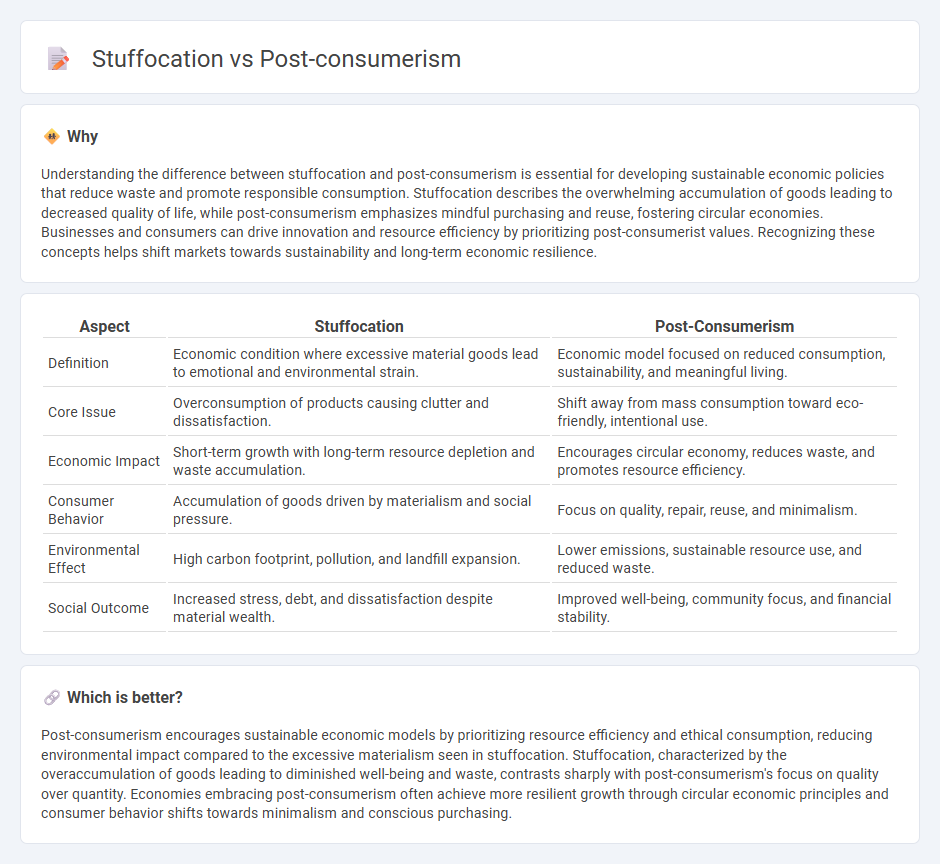
Stuffocation describes the overwhelming accumulation of material goods that surpasses consumer needs, leading to frustration and decreased well-being. Post-consumerism emphasizes sustainable consumption patterns, prioritizing quality, experience, and environmental impact over quantity. Explore the evolving economic paradigms shaping sustainable growth and mindful consumption.
Why it is important
Understanding the difference between stuffocation and post-consumerism is essential for developing sustainable economic policies that reduce waste and promote responsible consumption. Stuffocation describes the overwhelming accumulation of goods leading to decreased quality of life, while post-consumerism emphasizes mindful purchasing and reuse, fostering circular economies. Businesses and consumers can drive innovation and resource efficiency by prioritizing post-consumerist values. Recognizing these concepts helps shift markets towards sustainability and long-term economic resilience.
Comparison Table
| Aspect | Stuffocation | Post-Consumerism |
|---|---|---|
| Definition | Economic condition where excessive material goods lead to emotional and environmental strain. | Economic model focused on reduced consumption, sustainability, and meaningful living. |
| Core Issue | Overconsumption of products causing clutter and dissatisfaction. | Shift away from mass consumption toward eco-friendly, intentional use. |
| Economic Impact | Short-term growth with long-term resource depletion and waste accumulation. | Encourages circular economy, reduces waste, and promotes resource efficiency. |
| Consumer Behavior | Accumulation of goods driven by materialism and social pressure. | Focus on quality, repair, reuse, and minimalism. |
| Environmental Effect | High carbon footprint, pollution, and landfill expansion. | Lower emissions, sustainable resource use, and reduced waste. |
| Social Outcome | Increased stress, debt, and dissatisfaction despite material wealth. | Improved well-being, community focus, and financial stability. |
Which is better?
Post-consumerism encourages sustainable economic models by prioritizing resource efficiency and ethical consumption, reducing environmental impact compared to the excessive materialism seen in stuffocation. Stuffocation, characterized by the overaccumulation of goods leading to diminished well-being and waste, contrasts sharply with post-consumerism's focus on quality over quantity. Economies embracing post-consumerism often achieve more resilient growth through circular economic principles and consumer behavior shifts towards minimalism and conscious purchasing.
Connection
Stuffocation arises from excessive consumerism, leading to an accumulation of goods that exceed practical use, while post-consumerism advocates for mindful consumption and prioritizes sustainability. This shift encourages reducing waste and valuing quality over quantity, directly addressing the issues caused by stuffocation. By embracing post-consumerism, economies can transition towards circular models that minimize environmental impact and promote resource efficiency.
Key Terms
Minimalism
Minimalism prioritizes reducing material possessions to enhance quality of life, contrasting with post-consumerism which critiques excessive consumption patterns that drive environmental degradation. Stuffocation describes the stress caused by clutter and overaccumulation of goods, highlighting the psychological burden minimalism seeks to alleviate through intentional living and mindful ownership. Discover more about how minimalism offers practical strategies to combat overconsumption and promote sustainable lifestyles.
Overconsumption
Overconsumption drives both post-consumerism, which advocates for mindful consumption and sustainability, and stuffocation, the stress caused by excess material possessions overcrowding living spaces. Post-consumerism encourages reducing waste and prioritizing experiences over goods to counteract the environmental and psychological impacts of overbuying. Explore how adopting post-consumerist values can help alleviate the burdens of stuffocation and promote a balanced lifestyle.
Sustainability
Post-consumerism emphasizes reducing consumption by rethinking material needs and embracing sustainable living practices, while stuffocation highlights the psychological burden caused by excessive possessions and clutter. Both concepts advocate for minimizing waste and environmental impact, promoting circular economy principles, and fostering mindful consumption to enhance sustainability. Discover how integrating these approaches can transform lifestyles for a more sustainable future.
Source and External Links
Post-Consumerist Culture - Term - Prism - Sustainability Directory - Post-consumerism represents a societal shift away from defining worth by material possessions, focusing instead on experiences, relationships, and sustainability while rejecting the continuous buy-and-dispose consumer cycle that harms the environment.
Consumer Law for a Post-Consumer Society by Mateusz Grochowski - Post-consumerism refers to a trend where traditional material consumption loses importance as consumers seek ethical, environmentally protective consumption and fulfillment through experiences and social engagement.
Post-consumerism - Wikipedia - Post-consumerism is an ideology prioritizing well-being over material prosperity and promotes the idea of "self-defined enoughness," moving beyond addictive consumerism toward personal and societal satisfaction.
 dowidth.com
dowidth.com